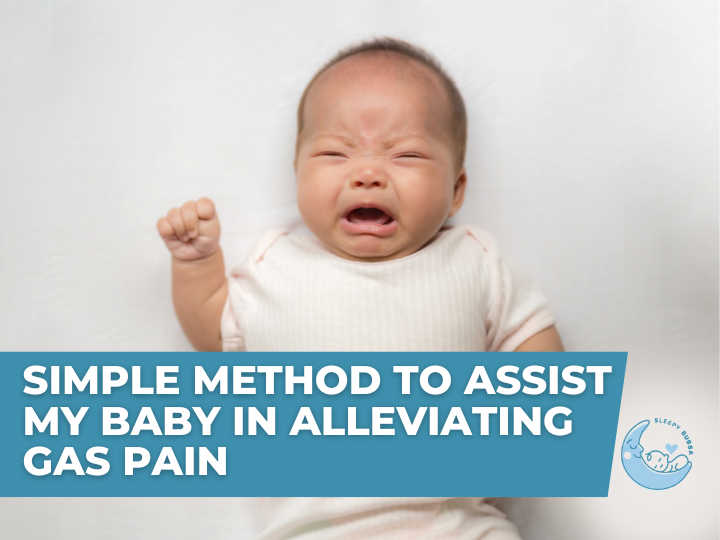Enquire Now with FREE 15 Mins Call
Simple Methods to Assist My Baby in Alleviating Gas Pain

Struggling to ease your baby’s gas pain and restore peaceful sleep? As a parent, witnessing your little one in discomfort can be heart-wrenching. Gas pain often disrupts both your baby’s comfort and precious sleep patterns, leaving you feeling helpless and exhausted. But fear not! In this comprehensive guide, we’ll explore simple yet effective techniques to soothe your baby’s tummy troubles. With the expert guidance of a certified baby sleep consultant, you can navigate this challenging aspect of parenthood with confidence. Let’s delve into the methods to ease your baby’s discomfort and restore peace and comfort to your home.
Understanding Gas Pain in Babies
Gas pain is a common occurrence in infants, often caused by trapped air in the digestive tract. This discomfort can lead to fussiness, crying, and discomfort for your baby. While occasional gas pain is normal, persistent or severe symptoms may indicate underlying issues that require medical attention. Consulting with a healthcare professional can help rule out any serious concerns and provide guidance on managing your baby’s gas pain effectively.
Burping Techniques
One of the simplest and most effective ways to alleviate gas pain in babies is through burping. After feeding your baby, hold them upright against your shoulder or sit them on your lap and gently pat or rub their back in a circular motion. This helps release trapped air from their stomach, reducing discomfort and preventing gas buildup. Experiment with different burping positions to find what works best for your baby, and be patient as you wait for them to burp.
Tummy Massage
Gentle tummy massages can provide relief for your baby by stimulating digestion and easing gas pain. Lay your baby on their back on a flat surface and use your fingertips to massage their abdomen in a clockwise motion. Apply light pressure and use slow, gentle strokes to avoid discomfort. You can also try gently moving your baby’s legs in a bicycling motion to help release trapped gas. Tummy massages can be particularly soothing before bedtime or during fussy periods throughout the day.
Warm Compress
Applying a warm compress to your baby’s tummy can help relax their muscles and alleviate gas pain. Fill a clean cloth with warm water and wring out any excess moisture. Place the warm cloth on your baby’s abdomen and hold it there for a few minutes. The gentle warmth can help soothe your baby and provide relief from discomfort. Always ensure that the compress is warm, not hot, to avoid burning your baby’s delicate skin.
Feeding Techniques
Making simple adjustments to your baby’s feeding routine can also help alleviate gas pain. If you’re breastfeeding, ensure that your baby is properly latched and positioned to minimize air intake during feeds. If you’re bottle-feeding, use slow-flow nipples and hold the bottle at an angle to reduce the intake of air bubbles. Additionally, consider paced-feeding to reduce the likelihood of gas buildup.
Warm Bath
A warm bath can be a soothing and comforting experience for your baby, especially when they are experiencing discomfort from gas pain. Adding a few drops of baby-safe essential oils, such as lavender or chamomile, to the bathwater can enhance the soothing effects of the bath. Lavender is known for its calming and relaxing properties, which can help to promote relaxation and relieve tension in both the body and mind. Chamomile has similar calming effects and is also known for its gentle, soothing scent. These essential oils can help to create a tranquil and peaceful environment for your baby, making the bath even more enjoyable and therapeutic. By incorporating warm baths into your baby’s routine, you can help alleviate their gas pain while also promoting relaxation, comfort, and bonding between you and your baby.
Probiotics
In some cases, probiotic supplements may help alleviate gas pain in babies by promoting healthy digestion and reducing gas production. Consult with your pediatrician before introducing probiotics to your baby’s diet to ensure they are safe and appropriate for your child. Your pediatrician can recommend a suitable probiotic supplement and guide dosage and administration.
Conclusion
Alleviating gas pain in babies requires patience, gentleness, and a willingness to try different techniques to find what works best for your little one. By incorporating simple methods such as burping, tummy massages, warm compresses, feeding adjustments, and probiotics into your baby’s care routine, you can help ease their discomfort and promote digestive health. For tailored assistance in addressing your baby’s gas pain and its impact on sleep, consider hiring a certified baby sleep consultant who can provide invaluable support. Let’s schedule a FREE 20-minute discovery call with Sleepy Bubba today to begin uncovering the potential causes of your baby’s sleep challenges and restoring tranquility to your home.








